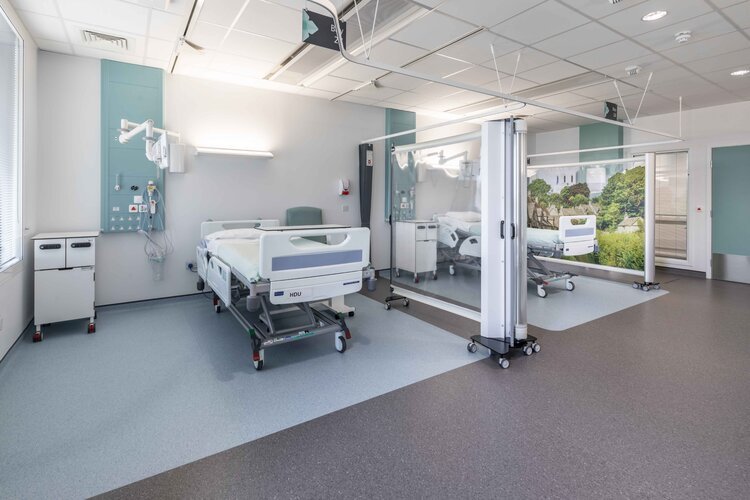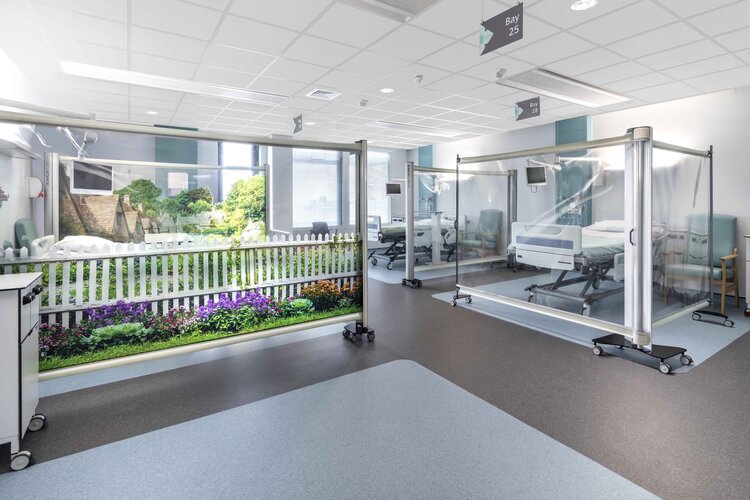Michael Korn: Design Fellow 2010
Case Studies
Posted: 07/01/2021
Design Fellowship
Michael Korn, KwickScreen
Tell us a little about yourself and KwickScreen
Founded
in 2009, KwickScreen designs and manufactures the best flexible privacy
solutions in the world. Our portable, retractable partition screens
provide innovative solutions that bridge the gap between functional
industrial design and artistic interiors, enabling users to create
private, personalised spaces adaptable to multiple uses, primarily in
the healthcare market.

Michael Korn : Chief Innovation Officer and Founder
Michael
gained an MEng in Manufacturing Engineering from Cambridge University,
then worked in industry for a year before gaining a scholarship from the
Royal Commission for the Exhibition of 1851 to study for a Masters in
Industrial Design Engineering at the Royal College of Art and Imperial
College London. During this course Michael won Design and
Entrepreneurship awards from the RCA and the Business School at
Imperial. This funded the start of KwickScreen which came out of his
final year project.
Michael has spent the last 12 years in the field of infection control and space management and has been focussed on improving and refining the KwickScreen product range as well as growing the company.
Denis Anscomb: Chief Financial Officer and Co-founder
Denis
read Maths at Bristol and then worked as an Analyst at Morgan Staney
and then a Bond Trader at London Capital Partners before doing an MBA at
LBS in Finance and Entrepreneurship. Denis co-founded KwickScreen to
commercialise Micahel’s final year project, and led the
commercialisation of the business, focussing on sales, and building
distributor relationships. Denis now lives in San Francisco, California
where he is helping to grow the KwickScreen Inc business in North
America, as this market represents a huge opportunity. In his role as
CFO, Denis is now facilitating discussions with potential investors and
exploring opportunities for M&A activity to further accelerate the
growth of the business.
What made you apply for the 1851 Royal Commission Design Fellowship?
1851
sponsored me to study Industrial Design Engineering at the RCA where I
invented a number of products which I wanted to commercialise on
graduation. After a year of trying, it became clear that the most likely
product to succeed was the KwickScreen. I did not want to go about
raising money to commercialise this idea, as any valuation would have
been very low, and I wanted to get stuck into designing and making a
soon as I could. Denis and I were fascinated by the dynamics of the
creative and manufacturing industries - as we saw lots of product design
engineers with inventions struggling with the same predicament. Our
approach was always very pragmatic and action orientated. We believed
that the best way to move the business and product forwards was to
immerse ourselves in the real words of manufacturing the product and
hospitals who are using the product.
What impact did the Design Fellowship have on your business?
The
fellowship gave us financial freedom to continue to bootstrap the
business and focus on things that mattered. We visited and had
discussions about subcontract partnerships with 5 manufacturing partners
and trialed the prototypes in tens of hospitals around the country.
This led to us selecting a partnership with Ultima displays - the
perfect fit for us at the time, and the feedback from the real-life
user-trials informed the product development that followed and also led
to some much needed early sales. The learnings from the research are as
relevant today as they were back then as the business remains at the
intersection of the creative and productive industry. The lessons
learned from seeing how most businesses operate and how we can add
significant value to the supply chain have directed the strategy of the
business to be both user-centred, innovative, and also control the means
of production.

What are the most important lessons you learnt whilst undertaking the Fellowship?
I
should not assume how industries work. If I want to know how people do
things, then go and visit them. If I want to know why they do things
that way, then ask them. If I can think of a better way of doing things
then do it, and see if it works. Keep improving what I’m doing, and if
something works then keep doing it. I learnt that in order to get
started I’d need to work with other companies and to do this, I’d have
to fit in with the way that they operate. It was easier to change myself
than it was to change them - as such I learnt the importance of being
flexible, agile, accommodating, polite, humble and nice :-)
What stage is your business at now and what does the future hold for KwickScreen?
The
company had a turnover of £1.2m y/e March 2019, £2.2m y/e March 2020,
and shipped £1m in April 2020. We anticipate revenues of >£5m this
year and continued growth for the foreseeable future as we supersede the
medical curtain market, and also launch more products that improve the
patient space. We will continue to invest in both R&D/NPD and also
our manufacturing capability to ensure we can remain responsive,
innovative and competitive.
What advice do you have for potential applicants to the Design Fellowship?
Apply
for the fellowship if the money and topic are of interest and need to
you. I’d encourage applicants to think about both the short and long
term benefits from their topic - as the learnings, contacts and
relationships are potentially something that could help you for years to
come.
